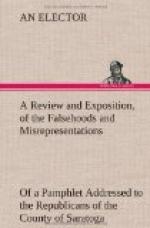The Irish, however, failed in this contest. They were not sufficiently good liars, and lacked the higher flights of villainy necessary to sustain the encounter. The essential English way in Tudor days, and much later, for administering a deadly blow to an Irish patriot was “assassination.” Poison frequently took the place of the knife, and was often administered wrapped in a leaf of the British Bible. A certain Atkinson, knowing the religious nature of Cecil, the Queen’s Prime Minister, the founder of a long line of statesmen, foremost as champions of Church and Book, suggested the getting rid of O’Neill by some “poisoned Hosts.” This proposal to use the Blessed Sacrament as a veritable Last Supper for the last great Irish chief remains on record, was endorsed by Cecil.
Another Briton, named Annyas, was charged to poison “the most dangerous and open rebel in Munster,” Florence MacCarthy More, the great MacCarthy. Elizabeth’s Prime Minister piously endorsed the deed—“though his soul never had the thought to consent to the poisoning of a dog, much less a Christian .”
To Carew, the President of Munster, Cecil wrote enjoining the assassination of the young Earl of Desmond, then “in the keeping of Carew”: “Whatever you do to abridge him out of Providence shall never be imputed to you for a fault, but exceedingly commended by the Queen.” After this, we are not surprised to learn that in her instructions to Mountjoy, the successor of Essex, the Queen recommended “to his special care to preserve the true exercise of religion among her loving subjects.” As O’Neill was still in the field with a large army, she prudently pointed out, however, that the time “did not permit that he should intermeddle by any severity or violence in matters of religion until her power was better established there to countenance his action.” That the character of their adversary was faithfully appreciated by contemporary Irish opinion stands plain in a letter written by James Fitzthomas, nephew of the great Earl Gerald of Desmond, to Philip II. “The government of the English is such as Pharaoh himself never used the like; for they content not themselves with all temporal prosperity, but by cruelty desire our blood and perpetual destruction to blot out the whole remembrance of our posterity—for that Nero, in his time, was far inferior to that Queen in cruelty.”
The Irish chiefs well sustained their part in meeting this combination of power and perfidy, and merited, on the highest grounds of policy the help so often promised by the King of Spain. They showed him not only by their valour on the field but by their sagacious council how great a part was reserved for Ireland in the affairs of Europe if he would but profit from it and do his part.




